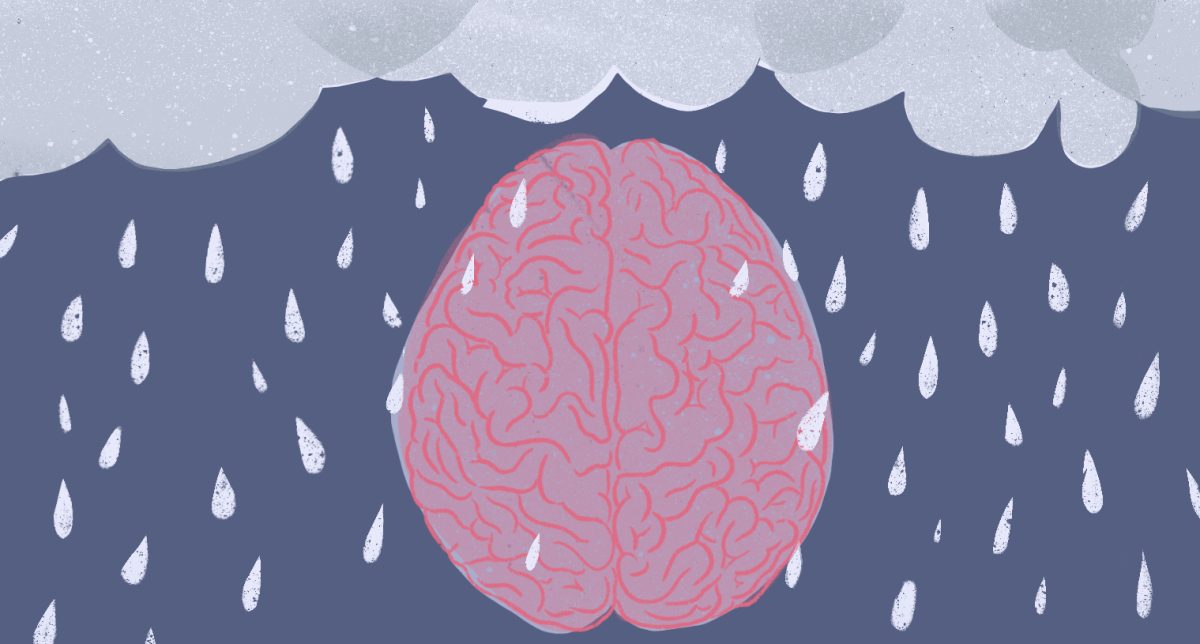
ILLUSTRATION BY: ARIA ZHU/The Hoya | A new study from Georgetown University Medical Center and MedStar Health researchers presented their new discoveries on the factors that cause depression in patients with post-stroke aphasia at the Meeting of the Academy of Aphasia in Japan on Oct. 20.
The Cognitive Recovery Lab at the Georgetown University Medical Center presented their new findings — at the Meeting of the Academy of Aphasia in Japan Oct. 20 — that depression in patients with post-stroke aphasia, a language disorder that affects a person’s ability to communicate, is primarily due to cognitive and social difficulties.
The study, “Drivers of Depression in Chronic Post-Stroke Aphasia,” led by primary investigator Dr. Peter E. Turkeltaub and first author Devna Mathur, is part of a larger research initiative: Brain-Based Understanding of Individual Language Difference (BUILD), led by the Cognitive Recovery Lab. For more than seven years, the project has addressed the individual neurological and linguistic differences of people with post-stroke aphasia.
Turkeltaub, director of the Cognitive Recovery Lab and study co-author, said the study was able to identify previously undiscovered factors of depression in aphasia patients compared to the general post-stroke population.
“Prior studies of post-stroke depression have often found that physical disability is a main predictor of depression. But in our participants, physical disability was unrelated to depression,” Turkeltaub told The Hoya. “Instead, cognitive and communication disability was related. We also found that loss of social participation and self perceived recovery level relate to depression.”
Turkeltaub said the study aimed to narrow the potential causes for aphasia, a broad neurological disorder that hinders communication, in post-stroke patients.
“Aphasia is an umbrella term: People have lots of different specific problems after a stroke, so the overall goal of the study was to figure out what it is about the stroke or each person’s brain that makes them have slightly different outcomes from stroke,” Turkeltaub said.
Depression is a common condition among post-stroke patients, impacting half of those who have experienced stroke. Despite this correlation, research studying the relationship between post-stroke aphasia and depression has not received much attention, according to Andrew DeMarco, assistant professor of rehabilitation medicine at GUMC and co-author of the study.
“Depression is a big issue after someone has a stroke but it’s underappreciated,” DeMarco wrote to The Hoya. “The studies that do investigate it often exclude individuals with aphasia after strokes that affect the left hemisphere period.”
Turkeltaub explained that the lack of research addressing the relationship between post-stroke aphasia and depression is also due to an incorrect assumption that people with aphasia cannot respond accurately to questionnaires.
“Most people with aphasia can answer questionnaires if they provide comprehension support,” Turkeltaub said. “One of the reasons we did this study is because these people are often left out of the study of post-stroke depression, and the causes of post-stroke depression might be different for people with aphasia.”
According to Sophia Frank (CAS ’26), an undergraduate research assistant at the Cognitive Recovery Lab, common misconceptions about aphasia can affect both clinical and scientific research. Frank emphasized that while people with aphasia may face communication challenges, they often maintain their cognitive abilities and can express their thoughts with support from their caregivers.
“A lack in the person’s ability to communicate does not reflect their ability to comprehend. In practice, they might try to address people with them that don’t have aphasia instead of looking at the person directly and that is something really overlooked by a lot of people in the scientific and clinical field,” Frank told The Hoya.
By including aphasia patients directly in the study, Turkeltaub’s research serves as a clear example that people with aphasia are able to speak for themselves when provided with adequate accommodations.
“People who have trouble communicating don’t necessarily lack different thoughts or feelings, they just need help communicating them,” Turkeltaub said.
Understanding the factors that contribute to depression in post-stroke aphasia patients is crucial in expanding the scope of currently limited treatment and improving mental health outcomes.
“The only treatment for aphasia is speech-language therapy, which helps improve aphasia, but can’t fix the problem completely. So most people with aphasia have some degree of communication difficulty for the rest of their lives,” Turkeltaub said.
These findings are not only a stride forward in the understanding of aphasia, but a significant movement forward in the pursuit of accommodating and including different disabilities in scientific and clinical research.
“We can’t just ignore those people when we are considering important health issues like depression after a stroke.” Turkeltaub said, “We need to work to support the communication, so that we can understand what they are experiencing and help them.”